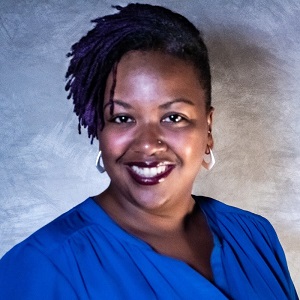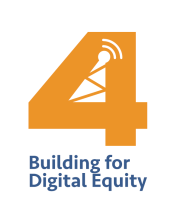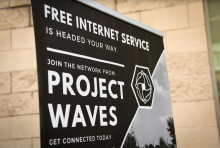
Fast, affordable Internet access for all.


Newark, New Jersey (pop. 307k) has been operating a dark fiber network for more than a decade. In recent years, the city has expanded its efforts to leverage those assets in an incremental effort to improve connectivity and competition for local business and residents, while also building out a robust Wi-Fi network. The goal: build a portfolio of approaches to connect the last twenty percent of the city that doesn't have access today.
This week on the podcast, Christopher is joined by Aaron Meyerson, Chief Innovation Economy Officer and Director of Broadband, and Anthony Avent, Technical Operations for City of Newark, to talk about the project. From reinvigorating the city's infrastructure with a new public-private partnership, to connecting almost a hundred large business locations, to enabling innovative smart-city applications to fight heat and pollution, to supporting more than 7,200 active Wi-Fi users every day, Newark isn't just sitting around waiting for someone to help solve local challenges. They're stepping up to the plate and tackling them themselves.
This show is 28 minutes long and can be played on this page or using the podcast app of your choice with this feed.
Transcript below.
We want your feedback and suggestions for the show: please e-mail us or leave a comment below.
Listen to other episodes here or see other podcasts from the Institute for Local Self-Reliance here.
Thanks to Arne Huseby for the music. The song is Warm Duck Shuffle and is licensed under a Creative Commons Attribution (3.0) license.

This week on the podcast, Christopher is joined by Angela Siefer (Executive Director of the National Digital Inclusion Alliance) and Greg Guice (Chief Policy Officer at the Vernon Berg Group) to tackle a familiar and increasingly important topic in the area of the digital divide: Universal Service Fund (USF) reform.
At present, the USF is overcommitted and stretched to its limits, providing critical operational and infrastructure support for rural broadband on an unsustainable budget. Angela and Greg talk with Christopher about how modernizing and expanding the program - including making the Affordable Connectivity Program (ACP) permanent - is necessary to meet the equity and inclusion goals we have set as a country.
Along the way, the group discusses the challenges in designing solutions that address the challenges of universal broadband access in an evolving digital landscape.
This show is 33 minutes long and can be played on this page or via Apple Podcasts or the tool of your choice using this feed.
Transcript below.
We want your feedback and suggestions for the show-please e-mail us or leave a comment below.
Listen to other episodes or view all episodes in our index. See other podcasts from the Institute for Local Self-Reliance.
Thanks to Arne Huseby for the music. The song is Warm Duck Shuffle and is licensed under a Creative Commons Attribution (3.0) license.

This week on the podcast, Christopher is joined once again by Sean Gonsalves, Associate Director of Communications for the Community Broadband Networks initiative.
Christopher and Sean start by discussing how a new wireless community broadband network in Syracuse, New York called Surge Link is helping the underserved households in their area. Syracuse is a prime example of how cities and towns are taking matters into their own hands by looking for ways to proactively provide affordable broadband access to their citizens right now instead of waiting for potential federal funding and local planning to align perfectly.
Sean and Christopher also unpack other recent news, including the FCC's plan to adjust the definition of broadband to 100 Megabits per second (Mbps) download and 20 Mbps upload speeds, the NTIA's Letter of Credit modifications, and the future of the Affordable Connectivity Program (ACP) with the White House asking Congress for an additional $6 billion in funding to continue the program through the end of 2024.
With ACP's future looming, Christopher and Sean finish by discussing the need and importance for a long-term solution to address the digital divide, including the financial sustainability of networks in rural areas.
This show is 33 minutes long and can be played on this page or via Apple Podcasts or the tool of your choice using this feed.
Transcript below.
We want your feedback and suggestions for the show-please e-mail us or leave a comment below.
Listen to other episodes or view all episodes in our index. See other podcasts from the Institute for Local Self-Reliance.
Thanks to Arne Huseby for the music. The song is Warm Duck Shuffle and is licensed under a Creative Commons Attribution (3.0) license.

This week on the podcast, Christopher is joined by Jennifer Hawkins, CEO of One Neighborhood Builders (ONB). ONB is a nonprofit organization based in Providence, Rhode Island that works to improve lives through housing and community connection. In 2020 we spoke with Jennifer about the wireless mesh network the nonprofit piloted to address community needs at the onset of the Covid-19 pandemic. It launched to much fanfare, and ONB has been steadily working to increase its reach and impact since.
After three years and half a million dollars in capital costs, the ONE|NB Connects network has improved its wireless service to 100Mbps symmetrical speeds. And while not everyone in the Olneyville neighborhood can access the network inside of their homes (it's a gap network, after all), with thousands of unique users per month able to access reliable connections for as long as they need, Jennifer tells Chris that they are starting to see the benefits for households facing significant health and economic disparities in the community. They end the show by talking about how ONB is using the expertise it has built along the way to plan for even more durable changes: baking wired infrastructure into new affordable housing MDUs.
Read a case study of the impact of the ONE|NB Connects network for more.
This show is 33 minutes long and can be played on this page or via Apple Podcasts or the tool of your choice using this feed.
Transcript below.
We want your feedback and suggestions for the show-please e-mail us or leave a comment below.
Listen to other episodes here or view all episodes in our index. See other podcasts from the Institute for Local Self-Reliance here.
Thanks to Arne Huseby for the music. The song is Warm Duck Shuffle and is licensed under a Creative Commons Attribution (3.0) license.

This week on the show we're featuring an episode of our new Building for Digital Equity podcast, which looks at how organizations and individuals around the country do work at the intersections of broadband infrastructure, affordability, access, and skills. From frontline specialists helping households sign up for the Affordable Connectivity Program to building small, digital equity-minded ISPs in Arizona, this series showcases the work and lessons from those helping folks get and stay connected in our communities and towns.
On this episode of the podcast, we talk with Brandon Forester - the National Organizer for Internet Rights at Media Justice. Christopher and Brandon talk about helping communities build more agency over how technology shows up in their neighborhoods and among the digital communities they create for themselves. He shares how Media Justice came to prioritize prison phone justice as one of its first issues, what organizing is and how local solutions may differ across communities, and the need to avoid purity politics in doing digital equity work.
This show is 20 minutes long and can be played on this page or using the podcast app of your choice with this feed.
Transcript below.
We want your feedback and suggestions for the show-please e-mail us or leave a comment below.
Listen to other episodes here or see other podcasts from the Institute for Local Self-Reliance here.
Thanks to Joseph McDade for the music. The song is On the Verge and is used per his Free-Use terms.

Brandon Forester is the National Organizer for Internet Rights at Media Justice. We talk about organizing for digital equity and more specifically Brandon's vision for communities having agency over how technology shows up in their neighborhoods and digital communities. We discuss how Media Justice came to prioritize prison phone justice, what organizing is and how local solutions may differ in different communities, and the need to avoid purity politics in doing this work.
This show is 20 minutes long and can be played on this page or using the podcast app of your choice with this feed.
Transcript below.
We want your feedback and suggestions for the show-please e-mail us or leave a comment below.
Listen to other episodes here or see other podcasts from the Institute for Local Self-Reliance here.
Thanks to Joseph McDade for the music. The song is On the Verge and is used per his Free-Use terms.
On the one hand, Cleveland is one of the worst connected cities in the nation. On the other hand, it’s also a metro region with among the highest Affordable Connectivity Program (ACP) enrollment rates.
That’s because of the efforts of digital inclusion practitioners like Gina Burch, Program Coordinator at the Ashbury Senior Computer Community Center. In the second episode of our new Building for Digital Equity podcast, Gina talks about how they trained digital navigators to help enroll eligible Clevelanders into the program that provides a $30/month subsidy for low-income households to pay for home Internet service.

As a new nationwide campaign to boost ACP enrollment is underway, Gina touches on something that is key for enrolling skeptical would-be beneficiaries: the need for trusted messengers and organizations with roots in the community to be a part of the process.
She also highlights some of the challenges they are seeing on the ground and why having high-speed Internet access, as well as the digital skills necessary to get online, is about so much more than shopping or streaming movies. Gina talks about the link between Internet access and access to health care such as making Covid vaccine appointments.
You can listen to the 14 minute interview below or it can be played using the podcast app of your choice with this feed.
Also, you can listen to other episodes here or check out our long-running Community Broadband Bits podcasts here.

As she'll note in the beginning of this interview with Sean Gonsalves, Gina Birch loves her job as Program Coordinator at the Ashbury Senior Computer Community Center in Cleveland, Ohio. She discusses the remarkable transition in Cleveland from a city lagging in digital equity metrics to one toward the top of its game.
They discuss the Affordable Connectivity Plan, ACP, and some of the challenges associated with the digital divide. Finally, they discuss some of the lessons they have taken from the Net Inclusion conference.
This show is 14 minutes long and can be played on this page or using the podcast app of your choice with this feed.
Transcript below.
We want your feedback and suggestions for the show-please e-mail us or leave a comment below.
Listen to other episodes here or see other podcasts from the Institute for Local Self-Reliance here.
Thanks to Joseph McDade for the music. The song is On the Verge and is used per his Free-Use terms.

In our first episode of this new podcast series, we wanted to queue up an interview with Margaret - Meg - Kaufer, who is President of the STEM Alliance in Westchester County, New York. We had previously spoken with Meg, as well as Yonkers Commissioner of Information Technology Bob Cacase, in episode 500 of the Community Broadband Bits podcast where they discussed their joint efforts to deliver Internet access to low-income households.
Meg updates us on those efforts on the heels of retiring the CBRS network earlier than expected. However, they have developed a replicable strategy for signing people up to the ACP and getting through the thoroughly unnecessary paperwork requirements.
This show is 22 minutes long and can be played on this page or using the podcast app of your choice with this feed.
Transcript below.
We want your feedback and suggestions for the show-please e-mail us or leave a comment below.
Listen to other episodes here or see other podcasts from the Institute for Local Self-Reliance here.
Thanks to Joseph McDade for the music. The song is On the Verge and is used per his Free-Use terms.
*This is the first installment of an occasional profile on Local Community Broadband Champions where we focus not so much on the technology, construction, and financing of a community network build, but on the personalities of the people who make it happen.
When Devin Weaver isn’t vibing at the Otto Bar or checking out the underground music scene at Metro Gallery, or even playing his bass guitar at home, the 28-year-old network engineer enjoys spending time amid the web of wires in storage closets inside low- and mixed-income apartment buildings dotting the city’s landscape.
It’s where his network design handiwork all comes together, snaking through the buildings to the routers installed in individual apartment dwellings, enabling residents to get gig speed Internet service.
That’s on par with what the regional monopoly provider Comcast offers city residents who can afford it. But in the buildings that Devin has made his technical playground, hundreds of financially-strapped households who subscribe to the fledgling community network he oversees get it for free – thanks to the philanthropy of dozens of organizations including the Internet Society Foundation, the France-Merrick Foundation, and the Digital Harbor Foundation.

Born and raised in Baltimore, Devin works for Project Waves, a non-profit organization founded in 2018 by an old high school classmate of his, Adam Bouhmad, to bring broadband to mostly low-income households in Baltimore City.
A Small, Rising Wave of Connectivity